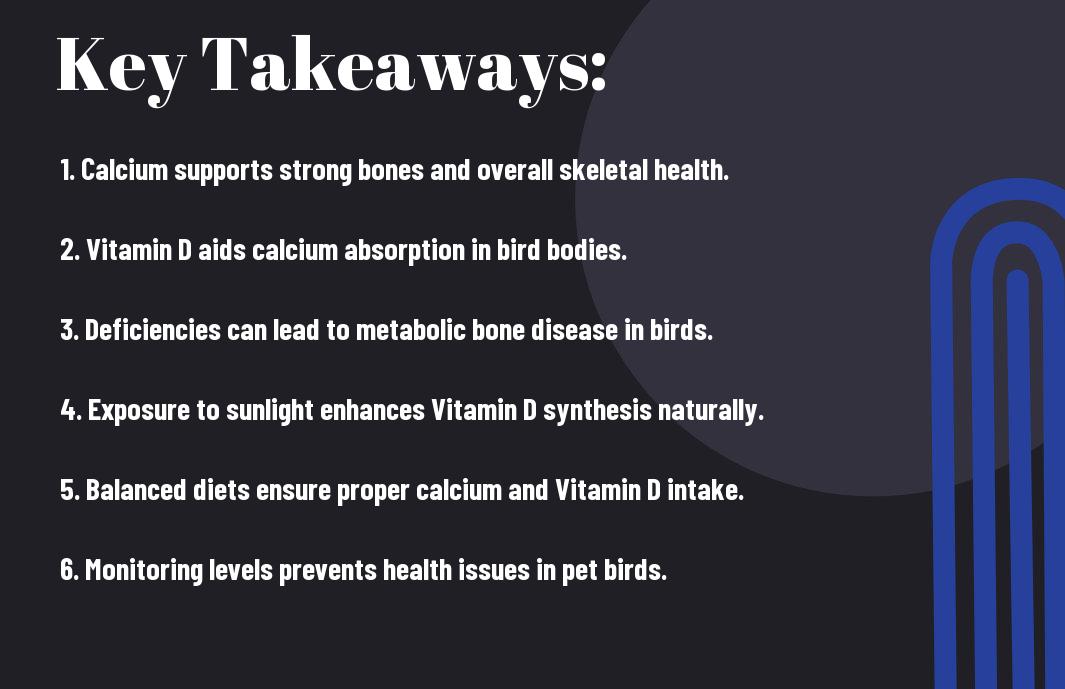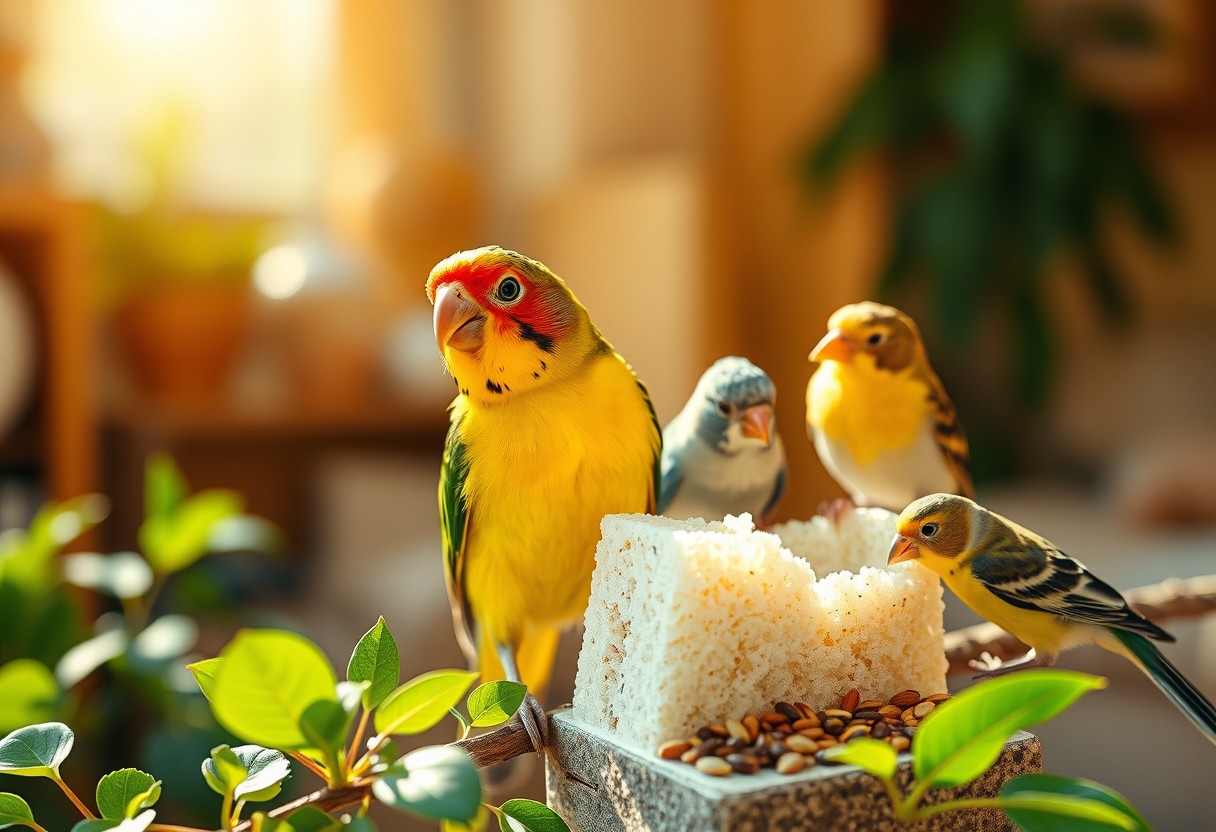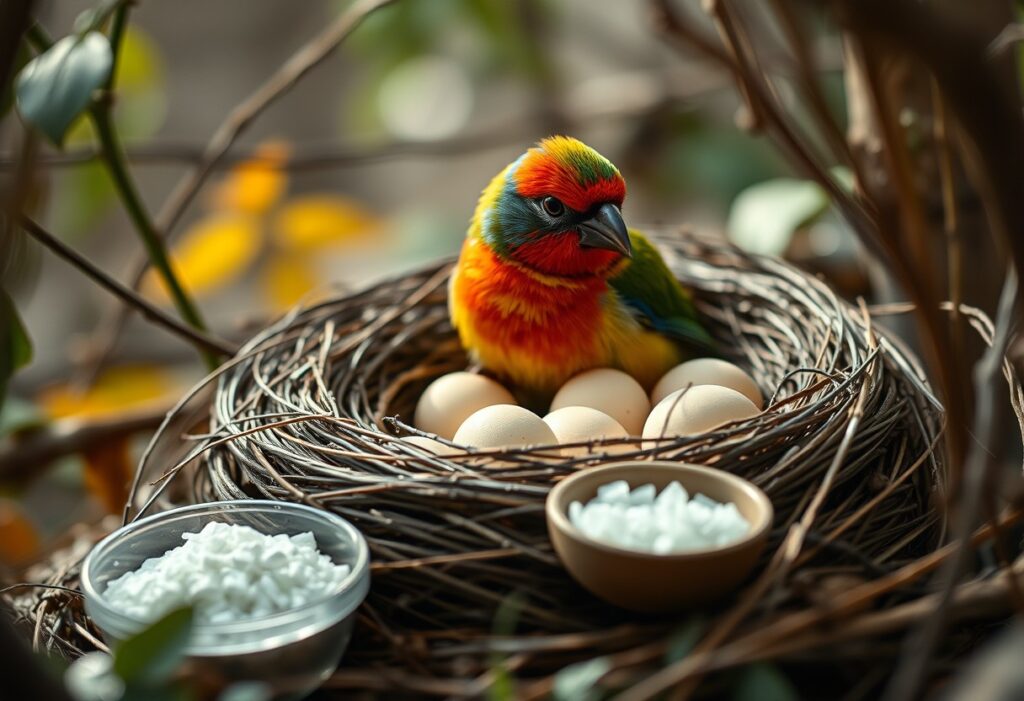Vitamin D is important for maintaining optimal health in your birds, as it plays a critical role in facilitating calcium absorption. Calcium deficiency can lead to serious health issues, including weakened bones and poor egg production. When you ensure your feathered friends receive adequate levels of both calcium and vitamin D, you help promote strong bones, support proper muscle function, and enhance overall vitality. Understanding the importance of these nutrients can greatly impact your bird’s health, longevity, and happiness. In this post, we’ll explore how you can effectively provide these vital nutrients to your avian companions.


Importance of Calcium in Bird Health
To maintain optimal health in birds, it’s imperative to understand the <>crucial role of calcium<>. Calcium plays a significant part in various physiological processes that are vital for your bird’s overall well-being. Without adequate levels of this mineral, birds may experience numerous health issues, including weakened bones, impaired muscle function, and reduced egg production.
Role in Bone Development
Development of strong bones is one of the primary functions of calcium in birds. Calcium is a critical component of the skeletal system, providing structural support and strength. In growing birds, a sufficient intake of calcium is imperative for laying the groundwork for a robust skeletal framework. Without enough calcium, your birds may suffer from conditions such as osteoporosis, which can lead to fractures and long-term mobility issues.
Moreover, birds typically require a greater calcium intake during their growing phases or when they are laying eggs. The proper balance of calcium in your bird’s diet ensures that their bones develop properly and stay strong throughout their lives.
Functions in Muscle Contraction
Any disruption in calcium levels can hinder your bird’s ability to function properly, especially concerning muscle contraction. Calcium ions play a vital role in enabling muscle fibers to contract and relax. When your bird’s body signals for a muscle to move, calcium is released from storage areas, allowing for the interaction of proteins necessary for muscle function. This is particularly important for birds that engage in flight and other strenuous activities.
Calcium not only influences muscle contractions but also ensures the heart muscle functions effectively, thereby supporting overall cardiovascular health. A deficiency in calcium can result in muscle weakness and fatigue, which can affect your bird’s physical activity levels and quality of life.
Impact on Egg Production
Contraction of the reproductive system is also notably influenced by calcium levels. During the egg-laying process, female birds require additional calcium to form strong eggshells. A lack of calcium can lead to soft-shelled or malformed eggs, impacting both the health of the chicks and the mother. You’ll want to ensure that your laying birds have access to extra calcium, such as through cuttlebone or specialized supplements, to support their reproductive efforts.
This heightened calcium requirement during egg production emphasizes the need for a well-balanced diet that includes sufficient calcium sources. Not only does proper calcium intake enrich your birds’ health, but it also increases the chances of successful breeding and hatching, benefiting your overall bird-keeping experience.
Significance of Vitamin D in Bird Health
While many pet owners may not realize it, Vitamin D plays a crucial role in maintaining the overall health of your birds. This fat-soluble vitamin is not just important for calcium absorption; it also supports bone health, immune function, and even homeostasis. Understanding the significance of Vitamin D can help you in providing a balanced diet that meets the needs of your feathered companions.
Mechanism of Calcium Absorption
Significance stems from the fact that Vitamin D acts as a key regulator in the absorption of calcium from the diet into the bloodstream. In birds, the presence of adequate levels of Vitamin D is crucial for facilitating the intestinal absorption of calcium and phosphorus. If your birds lack sufficient Vitamin D, their bodies may struggle to take in these important minerals, leading to potential deficiencies. This biochemical pathway is an intricate balance of nutrients that directly affects your birds’ health.
Furthermore, Vitamin D also promotes the reabsorption of calcium from the kidney tubules, ensuring that your birds maintain optimal calcium levels even in times of low dietary intake. As a result, you need to ensure that your birds have access to adequate sources of Vitamin D, either through dietary means or natural sunlight, to support their calcium metabolism effectively.
Prevention of Metabolic Disorders
Disorders related to calcium and Vitamin D deficiencies can lead to severe health issues in birds, including metabolic bone disease. When Vitamin D is insufficient, the body cannot properly metabolize calcium, potentially causing your birds to develop weak and brittle bones. This condition can manifest in various ways, including deformities, fractures, and even paralysis in severe cases, which can greatly impact their quality of life.
Metabolic disorders not only affect the bones but can also interfere with your birds’ ability to perform natural behaviors, jeopardizing their overall well-being. Regular monitoring of your bird’s diet and accessible UV light for Vitamin D synthesis can mitigate such risks. You might want to consult your avian veterinarian for advice regarding appropriate supplements or dietary adjustments where necessary.
Influence on Immune Function
Mechanism-wise, Vitamin D plays a significant role in enhancing the immune response of your birds. It has been shown to modulate the activity of various immune cells, contributing to the body’s ability to fend off pathogens effectively. An adequate supply of Vitamin D can boost the production of antimicrobial proteins, which help protect your birds from infections and diseases. This makes it imperative for you to ensure they receive sufficient Vitamin D in their diet or through controlled exposure to sunlight.
Vitamin D not only helps in immune regulation but also works synergistically with other vitamins and minerals to maintain a robust immune system in your avian friends. By prioritizing their Vitamin D intake, you enable your birds to withstand environmental stressors and pathogens more effectively, fostering a healthier living environment.
Calcium and Vitamin D Deficiency
All avian species require a balanced intake of important nutrients, and calcium and vitamin D are among the most critical for maintaining optimal health. Deficiencies in these nutrients can lead to severe health issues and should be addressed promptly to ensure your pet bird thrives. Understanding the symptoms of deficiency and its long-term consequences is vital in safeguarding your feathered friend’s well-being.
Symptoms of Deficiency in Birds
The symptoms of calcium and vitamin D deficiency in birds can manifest in various ways, impacting both your pet’s physical and behavioral health. Some of the most common signs include poor feather condition, lethargy, and a noticeable decrease in activity levels. You might also observe your bird engaging in unusual behaviors, such as excessive vocalization or aggressive tendencies, which can result from discomfort or pain caused by low calcium levels.
Another alarming indicator of deficiency is egg-binding in female birds, where they struggle to lay eggs due to a lack of calcium needed for proper shell formation. Additionally, you might notice signs of muscle tremors or even seizures, as calcium plays a crucial role in nerve function. If you observe these symptoms, it’s important to consult an avian veterinarian immediately for diagnosis and treatment.
Long-Term Health Consequences
One of the most alarming long-term health consequences of calcium and vitamin D deficiency is the potential for osteoporosis in birds. This condition leads to weakening of the bones, making them more susceptible to fractures and breaks, ultimately affecting your bird’s mobility and overall quality of life. If left untreated, such deficiencies can also result in impaired reproductive health in female birds, potentially leading to infertility or complications during egg-laying.
Deficiency in calcium and vitamin D can have lasting impacts on your bird’s overall health. Chronic low levels of these nutrients can also contribute to the development of metabolic bone disease, a condition that alters your bird’s skeletal structure and can result in lifelong pain and suffering. Therefore, it is crucial to be vigilant and proactive about your bird’s dietary intake to ensure a healthy, happy life filled with vitality.

Recommendations for Optimal Intake
Despite the critical importance of calcium and vitamin D for bird health, providing your feathered friends with optimal intake can sometimes be challenging. It is important to ensure that your birds receive adequate levels of these nutrients to promote healthy bone development, aid in muscle function, and support overall well-being. Ensuring the right dietary sources and considering supplementation when necessary can make a significant difference in your birds’ health.
Dietary Sources of Calcium
Calcium is vital for your birds, playing a significant role in their skeletal structure and metabolic processes. Natural dietary sources of calcium include leafy greens such as kale and dandelion greens, which are particularly rich in this important mineral. Additionally, providing your birds with cuttlebone and mineral blocks can supplement their intake, ensuring they have access to calcium as needed.
You should also consider including variety in your birds’ diet to improve calcium levels. Other good sources are crushed eggshells and certain seeds, though be cautious about the amount, as some seeds can be high in fat. A balanced approach to feeding will help prevent deficiencies or excesses, optimizing your birds’ calcium intake.
Sources of Vitamin D
Dietary sources of vitamin D for birds usually include foods like fatty fish, fortified grains, and specific greens. However, it’s important to remember that natural sunlight exposure is the most effective way for birds to synthesize their own vitamin D. If your birds reside indoors, you should consider using full-spectrum lighting to mimic natural sunlight, ensuring they can produce sufficient levels of this important vitamin.
This exposure to natural light not only helps with vitamin D synthesis but also promotes your birds’ physical activity and mental well-being. Always monitor the time your birds spend under artificial lighting to avoid potential overexposure, which can lead to other health issues.
Supplementation Guidelines
Recommendations for calcium and vitamin D supplementation can vary based on the species you keep. Always consult with an avian veterinarian to determine the specific needs of your birds regarding these nutrients. Generally, a calcium supplement should be given during breeding seasons or when dietary sources may not be sufficient. For vitamin D, it is vital to ensure your birds receive it through appropriate dietary sources and, if necessary, supplements, especially in situations where sunlight exposure is limited.
Another key point to remember is that while supplementation can be beneficial, it is crucial to avoid over-supplementation. Overloading your birds’ diet with calcium or vitamin D can lead to serious health issues, such as kidney damage or metabolic bone disease. Therefore, maintaining a careful balance and providing access to a variety of natural food sources is important for promoting your birds’ overall health and well-being.
Final Words
Conclusively, understanding the role of calcium and vitamin D in bird health is vital for anyone dedicated to their avian companions’ wellbeing. You must recognize that these nutrients are crucial for maintaining strong bones, proper muscle function, and overall vitality in your birds. An adequate supply of calcium, alongside the necessary vitamin D for absorption, plays an integral part in preventing diseases associated with deficiency, such as metabolic bone disease. This knowledge empowers you to create a more balanced and nutritious diet that caters specifically to the needs of your birds.
Moreover, ensuring that your avian friends receive enough sunlight or appropriate artificial UVB lighting can significantly enhance their vitamin D synthesis, further supporting bone health and immunity. By being proactive and educated on these critical nutrients, you can help your birds thrive, preventing health issues and promoting a longer, healthier life. Your commitment to mastering the necessary role of calcium and vitamin D will reflect in the vitality and happiness of your feathered companions.
FAQ
Q: Why are calcium and vitamin D imperative for bird health?
A: Calcium and vitamin D are crucial for the overall health and well-being of birds. Calcium plays a significant role in building and maintaining strong bones, supporting muscle function, and aiding in nerve transmission. In laying hens and other breeding birds, calcium is vital for eggshell formation. Vitamin D is important because it helps the body absorb calcium effectively. Without sufficient vitamin D, birds can suffer from calcium deficiencies, leading to health issues like metabolic bone disease, weak bones, and poor egg quality.
Q: How can I ensure my bird is obtaining enough calcium and vitamin D?
A: To ensure your bird gets enough calcium and vitamin D, provide a balanced diet that includes calcium-rich foods such as leafy greens, crushed eggshells, and calcium supplements like cuttlebone. Additionally, exposure to natural sunlight is beneficial because ultraviolet (UV) light helps birds synthesize vitamin D in their skin. If sunlight exposure is limited, consider using UV light bulbs specifically designed for birds, which can mimic natural sunlight and aid in vitamin D production. Always consult with an avian veterinarian for personalized dietary recommendations.
Q: What are the signs of calcium and vitamin D deficiency in birds?
A: Signs of calcium and vitamin D deficiency in birds can include brittle bones, soft or deformed eggshells, lethargy, muscle weakness, tremors, and difficulty in movement. You may also observe changes in behavior such as reduced activity levels or increased aggression due to discomfort. If you notice any of these symptoms, it is important to consult an avian veterinarian promptly. Regular health check-ups and appropriate dietary adjustments can help prevent deficiencies and maintain your bird’s health.











